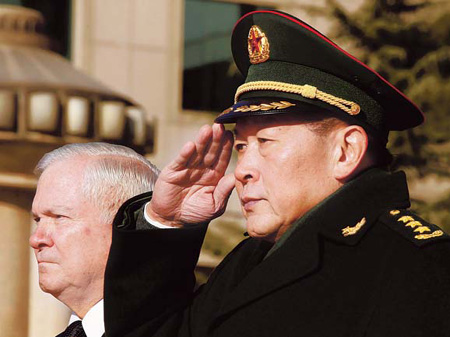Top News
Sino-US militaries seek to 'reduce miscalculation'
Updated: 2011-01-11 07:56
By Li Xiaokun and Cheng Guangjin (China Daily)
|
Defense Minister Liang Guanglie and US Secretary of Defense Robert Gates attend a welcome ceremony in Beijing on Monday. Larry Downing / the Associated Press |
China reiterates opposition to US arms sales to island
BEIJING - China and the United States on Monday agreed to jointly reduce the risk of "miscalculation" between the two powerful armed forces, as they restore military ties frayed by a massive US arms deal to Taiwan a year ago.
Defense Minister Liang Guanglie, however, reiterated China's opposition to US arms sales to Taiwan, an issue which visiting US Defense Secretary Robert Gates sidestepped.
Liang and Gates, after a morning of talks, announced during a joint news conference at the headquarters of China's Central Military Commission that they agreed to explore ways to reduce "misunderstanding" and "miscalculation".
"We are in strong agreement that in order to reduce the chances of miscommunication, misunderstanding or miscalculation, it is important that our military-to-military ties are solid, consistent and not subject to shifting political winds," Gates told reporters.
Gates also invited the chief of the People's Liberation Army's (PLA) general staff to visit Washington in the first half of this year.
Liang said they had "agreed that sustained and reliable military-to-military contacts will help reduce misunderstanding and miscalculation".
Both sides should join hands in the spirit of "respect, mutual trust, equality and reciprocity" to ensure the healthy and steady development of the relationship, he added.
Liang said that Chief of General Staff of the PLA Chen Bingde will visit the US in the first half of 2011, adding that exchanges of high-level officials and between educational institutions will continue.
On US arms sales to Taiwan, Liang said they "severely damage China's core interests".
"China's position has been clear and consistent. We are against it," he told reporters.
"We do not want to see such things happen again. We do not want US weapon sales to Taiwan to further damage the relationship between China and the United States and the two nations' armed forces," Liang added.
Asked about reports that Taiwan is buying MGM140 ATACMS (Army Tactical Missile Systems) surface-to-surface missiles from the US, Gates said the missiles are just for defense use, and were approved in 2008 by the Bush administration.
Yet he admitted US arms deals to Taiwan had hurt relations.
The two defense chiefs also denied their governments are entering an arms race.
Liang admitted China had made progress in building its military might and had developed weapons to meet its sovereignty and security requirements.
But he said China's military technology lags far behind the world's most advanced armed forces and does not threaten any country.
China is still years behind US capabilities in radar-evading aircraft, and even by 2025 the US would still have far more of these aircraft than any other nation in the world, Gates said before arriving in Beijing.
He also explained that Washington's repeated joint exercises with Seoul in seas not far from China in 2010 and the current presence of three US aircraft carriers in that region is by no means targeted at Beijing but Pyongyang.
Major General Luo Yuan, with the PLA Academy of Military Sciences, said the MGM140 ATACMS missiles, with a maximum firing range of 300 km, are able to reach Chinese mainland coastal targets across the 170 km-wide Taiwan Straits.
"They are obviously offensive weapons in terms of their capability," said Luo.
He also said US arms sales to Taiwan violated its own promises to China.
The US pledged in a joint communiqu signed in 1982 that it will not pursue a long-term policy of arms sales to Taiwan, the scale of arms sales would not surpass the scale at the time when the two nations established formal diplomatic ties, and arms sales would be gradually decreased till the problem is finally solved.
"It has been 28 years since the communiqu was signed, but the US has yet to fulfil its commitments," said Luo.
Gates arrived in Beijing on Sunday evening. He also met Vice-Chairman of the Central Military Commission and Vice-President, Xi Jinping, on Monday.
Xi expressed the hope that military-to-military relations could move forward in a healthy and stable manner.
On Tuesday Gates will meet President Hu Jintao, who is scheduled to visit Washington later this month.
Tang Yingzi, Wang Chenyan, Xinhua and Reuters contributed to this story.
China Daily
(China Daily 01/11/2011 page1)
Specials

President Hu visits the US
President Hu Jintao is on a state visit to the US from Jan 18 to 21.

Ancient life
The discovery of the fossile of a female pterosaur nicknamed as Mrs T and her un-laid egg are shedding new light on ancient mysteries.

Economic Figures
China's GDP growth jumped 10.3 percent year-on-year in 2010, boosted by a faster-than-expected 9.8 percent expansion in the fourth quarter.
